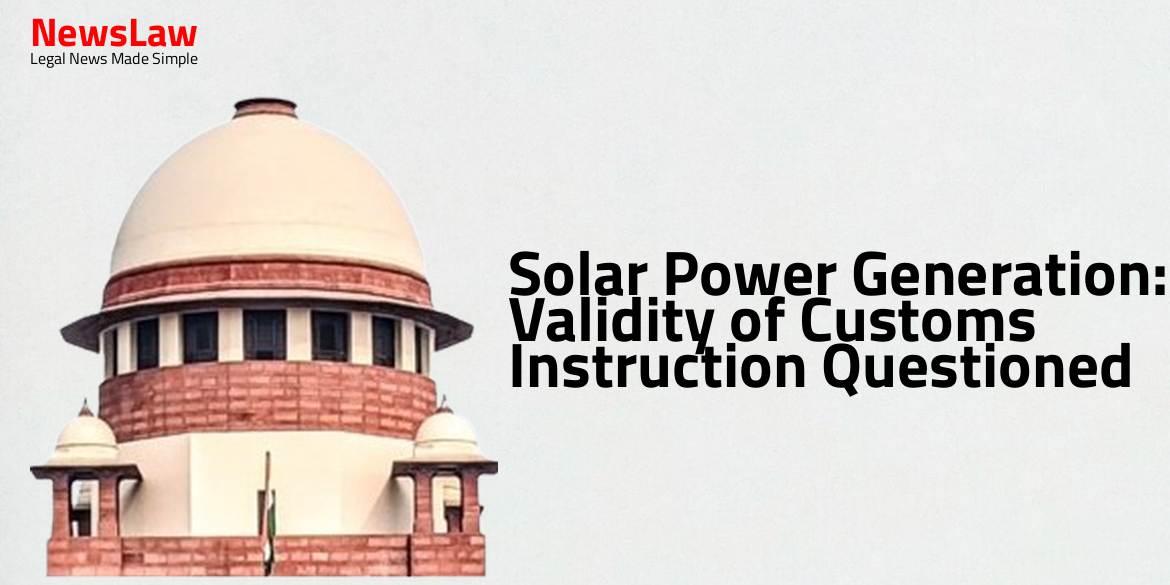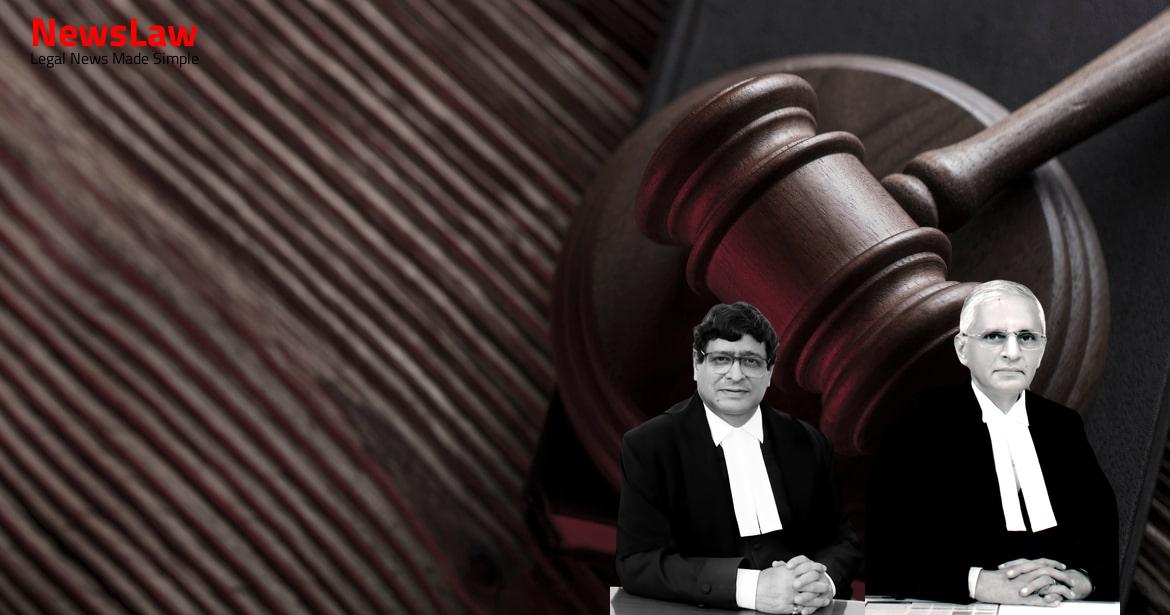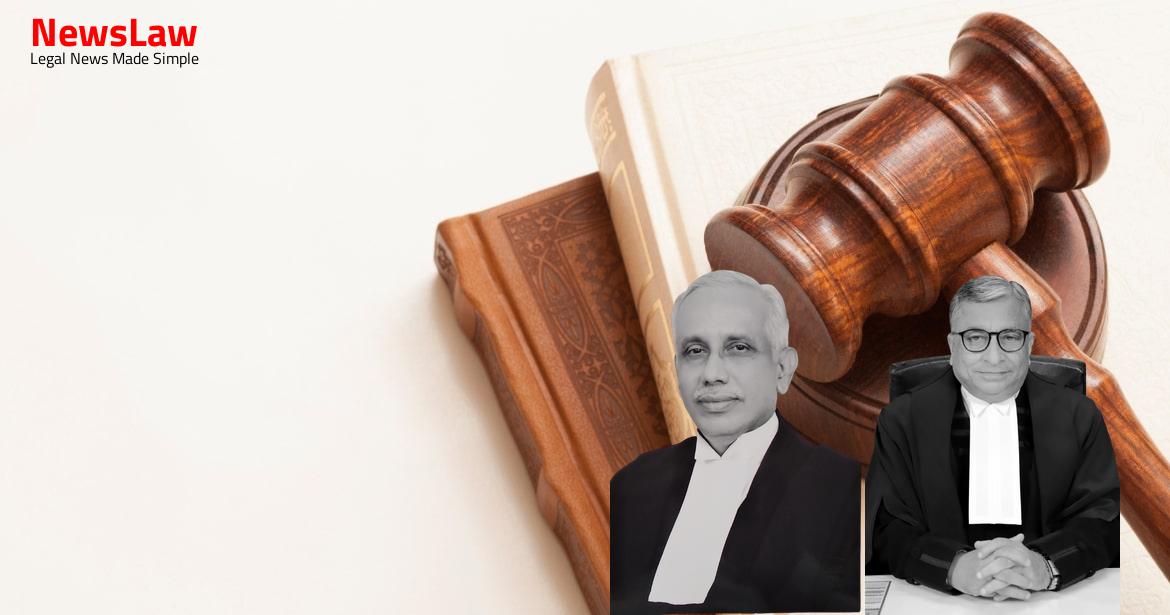The Delhi High Court recently delivered a significant judgment concerning the validity of the Customs Instruction in the context of Solar Power Generation. The case raised crucial questions about the applicability of regulatory measures to imported goods used in solar power generation, with key players like ACME and AVAADA challenging the Customs authority’s actions. Stay updated on this legal development impacting the renewable energy sector.
Facts
- The petitioners challenge the validity of the impugned Instruction dated 09 July 2022 issued under Section 151A of the Customs Act, 1962.
- The Instruction pertains to the warehousing of imported capital goods used in the generation of solar power.
- The petitioners argue that the Manufacture and other Operations in Warehouse (No.2) Regulations, 2019 should apply instead.
- Various Show Cause Notices were issued based on the impugned Instruction, calling for explanations on potential license cancellation.
- One petitioner in W.P.(C) 12386/2022 has challenged a letter of 23 August 2022 requiring a provisional duty bond for release of imported goods.
- Another petitioner in W.P.(C) 10838/2022 contests the impugned Instruction and a letter of 19 July 2022 cancelling their warehouse license.
- After the imposition of BCD in 2022-23, there was a reduction in imports overall.
- However, in 2023-24, there was an increase in the import of solar modules specifically.
- The data on imports is reflected in the chart provided, showing both capacity addition and monetary value of the imports.
Issue
- The main issue to examine is whether Circular by the respondents amounts to revenue legislation for imposing excise duty.
- Another key question is whether the suits must pertain to the recovery of possession of immovable property in Greater Bombay.
- The interpretation of Section 37-B of the Act needs to be analyzed within the scope of Section 37B Excise 37B.
- The primary issue is whether the dominant purpose test or the theory of apportionment applies to interpreting Section 14-A of the Act.
- There is a dispute regarding the interpretation of the phrase ‘in relation to’ concerning the earning of dividend income from shares.
Arguments
- The petitioners argued that the cancellation of the license was invalid and void as they were not given the opportunity to submit a BOE for warehousing their imported goods.
- They contended that the generation of electricity qualifies as manufacturing, thus satisfying the requirements of Section 65 for duty deferral.
- The petitioners challenged the contention that solar panels did not undergo a manufacturing process in the warehouse.
- They emphasized that the warehoused goods must undergo manufacturing or operations to benefit from Section 65.
- The petitioners argued that the law does not exclude any industry from the scope of Section 65, including the generation of solar power.
- They also contested the claim that they were circumventing duty payments by using the MOOWR Regulations, as the goods were imported duty-free before BCD was imposed.
- The import of solar cells and modules was previously exempt from BCD, but duty was later imposed by notification.
- The petitioners highlighted the significance of imported goods being housed in a warehouse, subject to a bond requirement before removal.
- They relied on the requirement for the officer of Customs to act in a quasi-judicial manner upon receiving an application.
- The petitioners emphasized the need for natural justice in the cancellation of licenses, and the authority’s duty to investigate breaches before cancellation.
- ACME and AVAADA raised concerns regarding the issuance of show cause notices proposing to cancel their licenses by the Customs authorities.
- The contention was made that solar power generation falls within the permissible activities under Section 65 of the Act and should not be excluded.
- The counsel for ACME and AVAADA argued that the interpretation of Sections 61 and 65 as presented by the ASG was questioned.
- It was emphasized that the larger question of solar power generation’s legality under the Act needed to be addressed, not just the validity of the impugned Instruction.
- The stand taken by the respondents on excluding electricity generation from Section 65 was deemed untenable by the petitioners.
- The counsel highlighted that schemes were introduced to promote domestic manufacturing and reserve capacity for locally manufactured components.
- The ASG suggested the court should rule on the scope and ambit of MOOWR Regulations concerning solar power generation, even if the impugned Instruction was found invalid.
- It was argued that the phrase ‘in relation to’ in reference to goods should be interpreted comprehensively depending on the context.
- The appellants contended that their suits were simply for injunction to protect their possession against illegal acts by the respondents.
Analysis
- Licensee must remove resultant goods from warehouse for export upon filing shipping bill or bill of export
- Licensee must affix one-time-lock to the load compartment of means of transport
- Licensee should take record of goods removed
- Certain goods can remain warehoused for specified periods based on type of goods
- Principal Commissioner of Customs or Commissioner of Customs can grant permission for manufacturing or other operations in warehouse
- Power to issue orders, instructions, and directions for uniformity in classification of goods and levy of duty
- License for warehouse may be cancelled if licensee contravenes provisions of the Act or breaches license conditions
- Cancellation of license may be done by Principal Commissioner of Customs or Commissioner of Customs
- Goods can be cleared from warehouse for home consumption upon presentation of bill of entry
- Timeframe for clearance of warehoused goods for home consumption specified
- Interest payable on goods remaining in warehouse beyond specified period
- Regulations to apply to units operating under Section 65 of the Act or applying for permission to operate under Section 65
- Grant of permission for operating under regulations to be done by designated Customs officers
- The sections of the Act and various Regulations were scrutinized in the context of the larger policy measures adopted by the Union of India.
- The Judgment referred to earlier decision in Faridabad Iron & Steel Traders Association vs Union of India highlighting the duty of quasi judicial authorities to exercise independent judgment free from administrative influences.
- Instances were cited where circulars issued by the executive were found to be contrary to statutory provisions, emphasizing the need for adherence to the law over administrative instructions.
- Judicial interpretation focused on the clear language of statutory provisions and the need for legislative amendment if adjustments are deemed necessary, rather than judicial interference.
- The significance of giving effect to the intention of the legislature as evident from the words used in the statute was underscored.
- The limitation on courts to modify express legislative language and the preference for literal interpretation unless ambiguity exists were emphasized.
- Concerns regarding undesirable consequences or anomalies resulting from legal constructions, and the approach to selecting a just, reasonable, and sensible interpretation rather than one that leads to injustice were discussed.
- Various court decisions were cited to illustrate the application of statutory interpretation principles in different contexts, focusing on giving effect to the legislative purpose and avoiding unjust or absurd outcomes.
- It would be incorrect to recreate or reassemble Section 65 to exclude a specific category of activity based on its impact or experience.
- The demand for a provisional bond for the release of goods was raised in W.P. (C) 12386/2022.
- The court cannot deploy principles of purposive interpretation to correct perceived anomalies in the working of solar power generation under Section 65.
- Policy issues regarding the impact of solar power generation on local generators should be addressed through appropriate remedial measures by the respondents and not by judicial intervention.
- Introducing conditions of ineligibility in the guise of statutory interpretation is not within the purview of the court.
Decision
- The Board’s instruction mandating review of existing licenses and follow-up action has been quashed.
- Detailed orders were passed on 04 August 2023 regarding the issue and Application for Directions.
- The operation of the impugned Show Cause Notice (SCN) was stayed and confirmed on 26 August 2022 during the pendency of the writ petition.
- The present writ petitions have been allowed based on the reasons provided.
- The amendment application moved by the petitioner regarding the SCN was assailed.
- W.P.(C) 12386/2022 will stand at 179.
- The parties will proceed as per the directions issued in this batch.
Case Title: JAKSON POWER PRIVATE LIMITED Vs. CENTRAL BOARD OF INDIRECT TAXES AND CUSTOMS & ANR. (2024:DHC:3615-DB)
Case Number: W.P.(C)-1507/2023



